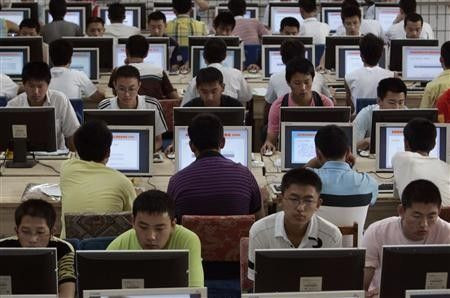No Internet-Fueled Arab Spring For China's 538 Million Web Users

BEIJING -- The pen may be mightier than the sword, but will freedom prove greater than the "Great Firewall?"
Maybe that question seems late in light of recent regime change triumphs of the Arab Spring, which benefitted greatly from social media. But China's rising Internet population and its accompanying surge of "microbloggers" present a new challenge on the front of freedom and human rights.
Earlier this summer, the Associated Press reported that China's Internet population had risen to 538 million users, a figure likely to grow as the country of 1.3 billion people continues to develop.
But as the Chinese Internet community grows, one aspect remains constant: government censorship. Beijing's Orwellian attempts to monitor 538 millions users are both critical and increasingly challenging for the authoritarian regime.
"Information control is one of the core values of Chinese Communist Party. ... They will not loosen the rope of Internet censorship. And also because of that fundamental nature, there will [be] little chance of [a] similar Arab Spring," said Chinese Internet researcher and journalist Michael Anti. Anti (whose name is Zhao Jing, but uses a pseudonym) should know. Microsoft deleted his blog in 2005 after bowing to pressure from the Chinese authorities.
Other examples of China's attempts to keep a lid on the Internet are numerous and prominent: In 2006, when Chinese authorities blocked Google, the company agreed to use a censored version of the search engine. But having had its fill of government strong-arming, Google made a highly publicized exit in 2010. Google searches in China are now routed through Hong Kong, a special administrative region within China.
In wake of deadly riots in Urumqi in 2009, authorities cut an array of communications to the entire province of Xinjiang, where Muslim Uyghur separatists want to break from Beijing. Only some six months later was Internet access restored to residents.
Earlier this year, Beijing again flexed it censorship muscles when commenting functions on two major microblogging sites -- weibo.com and qq.com -- were disabled for several days when rumors of a coup began to spread.
On June 4, the 23rd anniversary of the Tiananmen Square massacre, Internet monitors attempted to prevent users from searching for any reference to the notorious incident. These events may be evidence that Beijing is determined to do whatever it takes to stem the flow of information.
David Keyes, executive director of Advancing Human Rights, a nonprofit group based in New York City, said that "China fears freedom of the Internet because it is a direct challenge to autocracy. The firewall China has built is proof of its insecurity. A powerful and confident nation would not harass online activists. Rather, it would encourage freedom of thought and dissent."
That's the international standard, and China, increasingly a global player -- is torn between maintaining control and preserving good will abroad.
Just a month after suppressing Tiananmen Square references, China voted with 46 other countries on the United Nations Human Rights Council to declare access to the Internet a human right.
China gave its support for the resolution with a caveat: "Free flow of information on the Internet and the safe flow of information on the Internet are mutually dependent." That falls flat with Anti: "They voted aye for the 'freedom' they defined, which means nothing."
Meanwhile others have challenged the concept itself, saying that perhaps access to the Internet isn't a human right. In an op-ed in The New York Times, Vinton G. Cerf, a fellow at the Institute of Electrical and Electronics Engineers and a vice president and chief Internet evangelist for Google, argued that "technology is an enabler of rights, not a right itself."
Cerf wrote that the creators of technology themselves must be held accountable for the safety of those online: Improving the Internet "must be done with an appreciation for the civil and human rights that deserve protection - without pretending that access itself is such a right."
Regardless, some U.S. companies have come under scrutiny for supplying oppressive regimes with the technology needed to stifle citizens' voices online. But China's massive online community is a potential market that could make sites like Twitter and Facebook drool.
According to Anti, the microblogging site Weibo has 274 million users, almost double the number of active users on Twitter.
"Weibo is now becoming the public sphere in China. Since all Weibo companies put their servers in Beijing, the authorities have 100 percent access to controlling the data, and much easier than before," Anti said.
Keyes, too, acknowledged the extent of China's efforts, but said individuals yearning for liberty are powerful in their own right.
"Though the Chinese government has tremendously sophisticated tactics for controlling information, in today's age, it is increasingly hard to block and censor everything online. There are just too many innovative ways of breaking through the firewall. As people are exposed to more information, they crave it more," Keyes said.
"Freedom is infectious, and I believe one day average Chinese citizens will enjoy their unalienable rights."
Taylor Collins is an Asia-based freelance writer.
© Copyright IBTimes 2024. All rights reserved.





















